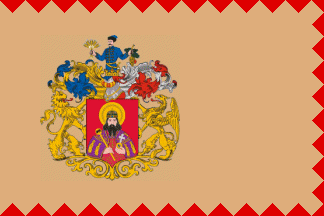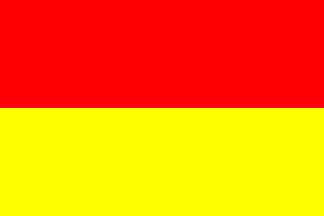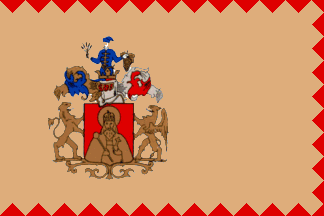
by Zeljko Heimer and István Molnár, 16 May 2001

Last modified: 2002-11-09 by dov gutterman
Keywords: hungary | miskolc | borsod | diosgyori | football |
Links: FOTW homepage |
search |
disclaimer and copyright |
write us |
mirrors

by Zeljko Heimer and István Molnár, 16 May 2001
See also:
Based upon Res. No. 30/1999. (X.15.) of the Council of the
City of Miskolc about the modifying of the Res. No. 1/1990 of the
city and about the readopting the CoA granted in 1909
István Molnár, 16 May 2001

by Antonio Martins, 28 Febuary 2001
This flag appears at Dr. Széll Sándor: Városaink neve,
címere és lobogója (1941) as "Miskolc, Borsod
Co.".
István Molnár, 20 October 2000
Red and yellow horizontal diband.
Antonio Martins, 28 Febuary 2001
Miskolc city - "The bottom part of the CoA of the city
preserved the pictures of the old seal. In the top red part there
is a worker in asbestos dress symbolises the becoming industrial
city. The dividing three blue lines are the three rivers of the
city: the Sajó, the Hejő and the Szinva."
Source: A magyar városok címerei (CoAs of the
Hungarian cities and towns); 1975
István Molnár, 17 December 2000
The communist type flag and CoA were adopted by 4/1974 and
6/1974 resolutions of the Soviet of Miskolc city
István Molnár, 15 May 2001

by Zeljko Heimer and István Molnár, 16 May 2001
I found Miscolc symbols in the web
Flag of the city: <www.uni-miskolc.hu>.
City CoA: <www.miskolc.hu>.
Dov Gutterman , 28 December 1998
Dov found an URL with a photo of the flag of the Hungarian
city of Miskolc as well as one with a picture of the city. There
is an explanation concerning this one at
http://online.cos.hu/Miskolc/e_cimerrol.html (defunct).
Interesting is that there is a short explanation concerning the
flag, or better the flagS of this city. What Dov found is in fact
the decoration flag of the city. I quote from the webpage:
"The flag of Miskolc town: it is fixed to a flagpole and
made of the traditional material: red-yellow (red-gold) coloured.
The decoration flag of Miskolc town: gold coloured and in the
edges of its field, which is decorated with picot-edges, the seal
of the town can be seen." ( seal is to be understood as
"coat of arms").
Pascal Vagnat , 29 December 1998
The text on the page explains the figure on the helmet as
"Hungarian Haiduk, who is wearing a blue dolman decorated
with gold soutache and a gold hilt sword bounded to his
side." Well, if they say so, but Haiduk (or Hajduk) is
rather a Croatian soldier from the mid-Adriatic coast and its
background area (like in football club Hajduk Split). But, of
course, at the time when arms (or seal) were granted, we were
parts of the same country, and surely some Haiduks were ingaged
in Hungarian troops. Anyway, the discussion would not lead us
far, but it just stumped me. I would rather expect Hussar or
something of the kind.
Zeljko Heimer , 8 January 1999
I looked at one of my Hungarian ethnography books, and the
Hajdu' are spoken of. It says, (translated from Hungarian) , that
when the Turks took over the De'lvide'k (Banat and Bacska) and
stole the herds (my apologies to any Turks present) the Hajdu
sheperds wandered to and fro until (Stephen) Bocskai hired them
as mercenaries. After the Turkish wars, they were settled down in
the Alfo:ld (the great Hungarian Plain)and remained there. I
would say that it was a gold field (it just seemed to be cloudy
when "they" took that picture), bordered with red
triangles.
Georges Kovari III , 8 January 1999
Miskolc is the capital of Borsod-Abauj-Zemplen County
(Borsod-Abaúj-Zemplén Megyá;). The flag has beige (butting?)
filed, bordered around three outer edges with red triangles, with
the CoA of the city in the middle.
Zeljko Heimer , 8 January 1999
This is more precisely the ceremonial flag of the city of
Miskolc as the explanation for the coat of arms says. The German
version says "Ehrenfahne" (flag of honour).
Pascal Vagnat , 8 January 1999
Well, the impression I get from the site is that the
ceremonial flag has the CoA, the triangles in the edges, and the
fringe. The "civil" flag, then, the way I understand
it, is a Landesfarben type red and gold bicolour.
Georges Kovari III , 9 January 1999
Shield: gules demi-St. Stephen holding a royal orb and
sceptre, crownedwith his own crown, all or. Crest: from a helmet
argent, crowned with an ancient crown or, issuant asoldier
dressed azure holding five stems of grain in his dexter hand and
a bunch of grapes in his sinister hand, all proper. Mantling:
dexter azure lined or, sinister gules lined argent. Supporters:
dexter a lion, sinister a griffin both standing on an ornamented
compartment, all or.
Santiago Dotor , 11 January 1999
Above is the ceremonial flag. However Pascal V. wrote:
"The flag of Miskolc town: it is fixed to a flagpole and
made of the traditional material: red-yellow (red-gold) coloured.
" Those words are consist with the Historical
Flag of red over yellow.
Dov Gutterman, 23 October 2000
It was used between 1991-1999. Here
is the Res. No. 1/1990 (XII.29.) of the Council of the City of
Miskolc about the flag of Miskolc. The CoA and the flag were
adopted on 1th January 1991. The flag is gold (yellow) with red
wolfteeth and with the CoA. On the CoA you can see St. Stephen I,
- the first king of Hungary.
István Molnár, 15 May 2001
1990 - 1999 Coat of Arms
mi.gif)
from <www.miskolc.hu>
From <online.cos.hu/Miskolc> (defunct) :
The present coat of arms of the town of Miskolc was created in
1909 based on the seals of the town. The first print of the
town's seal can be found on a document dated 7th July 1389. It
was affixed on yellow sealing wax. Its legend is
indistinguishable and its heraldic figure is a royal head
decorated with fleury lilied crown. The identity of this royal
head is disputed. The name of St. King Steven arose because he
was the patron saint of the Avas church but the fleury lilied
crown refers to our other king Lajos (the Great). The next seal
version likewise affixed on yellow sealing wax. Its legend is
"Sigillium Civitas Miskolcz" on which there is a
bearded royal head who is, possibly, Zsigmond Luxemburg. Next to
the head there is a moon on its left hand side and a six pointed
star on its right hand side. Another version of this is known as
well, on which the engraving is new. Possibly, it was made
instead of the old threadbare one. At one time the print seal was
a figure with spread legs instead of the crowned head and then
the full figure of St. King Steven who holds a sceptre and an orb
in his hands. This seal was used until 1687. After then instead
of the figure of the king appears a Haiduk with a bunch of grapes
in one of his hands and with a wheat stalk in his other hand. In
1909, when the town received the right of the municipal authority
the seal was created by amalgamating the previous seal pictures.
On this on the red field of the snout bottom shield the
half-length portrait of St. King Steven can be seen wearing a
purple cloth with a gold cloak and with the Saint Crown on his
head. It is encircled with gold sparkling disc. In his left hand
there is a gold royal sceptre and a gold orb with twofold crux.
On the shield, the decoration of the crowned open helmet turning
to the right hand side, as far as heraldry is concerned, is a
Hungarian Haiduk, who is wearing a blue dolman decorated with
gold soutache and a gold hilt sword bounded to his side. In his
right hand he holds five gold wheat stalks and gold bunch of
grapes with leaves in his left hand. The cover of the helmet from
the right hand side is blue-gold coloured, as far as the rules of
the heraldry are concerned and red-silver coloured from the right
hand side. The shield placed on gold arabesque is hold by a gold
lion sticking his tongue out and turning towards the centre from
the right, as far as the rules of the heraldry are concerned, and
a gold griffin sticking his tongue out and turning from the left
towards the centre as well.
Pascal Vagnat , 29 December 1998
The CoA of Miskolc city in 1909 can be seen Here.
István Molnár, 18 March 2001